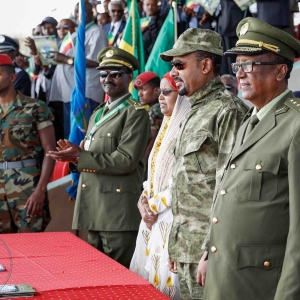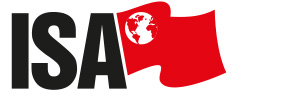New Cold War
Ethiopia: A War with Regional and Global Consequences






The war in Ethiopia has taken new turns in recent weeks, including an increased role in the cold war between Chinese and US imperialism. Advances from Tigray and allied forces not far from Addis Ababa have now been pushed back by the federal army forces.
The consequences for the population are catastrophic. Since the war started in Tigray early November last year, the region has been under a de facto blockade of all deliveries of food or medicine. “Tigray is probably the worst place to live in the world right now”, UN relief chief Martin Griffiths commented in November.
According to the World Food programme of the UN, 9.4 million people in Ethiopia need urgent food supplies. In Tigray, “an estimated 400,000 now live in famine-like conditions”.
The effects of the war will have both regional and global consequences. In late November, both US Secretary of state, Anthony Blinken, and China’s foreign minister, Wang Yi, visited Addis Ababa. Ethiopia has the second largest population in Africa, 110 million, and is where the African Union has its headquarters. From 2011, its annual economic growth was over 10 percent. This was based on a “Chinese model”, with the state and multinational companies establishing special manufacturing zones for export. At the same time, Ethiopia has been a key military ally to US imperialism, for example intervening in Somalia with 30,000 troops in 2006–09.
The apparent stability of Ethiopia under the dictatorial Tigray-led EPRDF government since the early 1990s served both imperialist powers well. US imperialism under Bush or Obama had no problem with any opposition being labelled as terrorists and imprisoned. China, being the main investor in the country, regarded Ethiopia as a key country in its global Belt and Road Initiative.
With the present war, the two imperialist forces have taken different positions. US imperialism under Biden wants to focus on Asia and China, and to emphasise its “democratic” credibility. Blinken has warned of a break up of Ethiopia with huge regional, political and humanitarian repercussions. Washington has since the war began tried to put pressure on Abiy Ahmed’s Ethiopian regime to end the war and find some kind of negotiated solution with the Tigray leaders. In order to achieve this, the US has implemented sanctions on the Ethiopian government.
Beijing, on the other hand, has with the visit of Wang Yi declared its full support for the Ethiopian government. Drones from China have been instrumental in the recent federal offensive. Already before the war, Abiy Ahmed allied himself with the United Arab Emirates that also assisted with drones and arms. So has the Iranian regime. Both Beijing and Tehran hope to advance their positions against US imperialism, including cooperation with the UAE.
The mass revolt and Abiy Ahmed
The Ethiopian army, joined by Eritrean troops and Amhara militias, first occupied most of Tigray a year ago. Abiy Ahmed then called it a victory and a “police operation”. In June, however, the Tigray Defence Forces retook Mekelle, the capital of Tigray, most of the region, and launched an offensive into Amhara and Afar.
In September and October, the TDF declared it had allied with the OLA, the Oromo Liberation Army. The OLA was originally the armed wing of the Oromo Liberation Front, an organisation for the independence of Oromia, the region with the biggest population in Ethiopia. When Abiy Ahmed came to power in 2018 it was an attempt by the ruling elite to derail mass protests of 2016–17. At that stage, particularly youth in both Oromia, which surrounds Addis Ababa, and Amhara, challenged the regime over unemployment, land grabbing, lack of democratic rights and more. When the regime declared a state of emergency, it was met with a three-day strike in February 2018. The regime then lifted the state of emergency and Abiy Ahmed, an officer and government minister of Oromo origin, became Prime Minister.
The OLF leadership were among those endorsing Abiy Ahmed, and so were many other opposition figures as well as imperialism. Abiy Ahmed released thousands of political prisoners and promised change. At the same time, he stood for another economic model, including privatisations, that put him on collision course with the previous ruling elite, dominated by the Tigray People’s Liberation Front.
The OLA broke with the OLF over Abiy Ahmed, and declared it would continue an armed struggle for Oromia.
The war since June
The Ethiopian and Eritrean forces were hated occupation forces of Tigray this year, with many reports of massacres, mass raping, destroyed health centers etc. Tigray was then, and still is, under blockade, with electricity, internet and its banks closed down.
The TDF forces, allied with OLA, forced into Amhara over the summer and autumn. They conquered several important towns, including Dessie that is only 25 kilometers from Addis Ababa. The forces seemed close to Mille, a town close to the road between the capital and Djíbouti, the de facto Ethiopian harbour.
In an interview with Swedish public sector radio, a commander of OLA said Addis Ababa was surrounded and it was only a question of days until it would be taken. Western governments and the UN evacuated their citizens.
The response from Abiy Ahmed’s regime was desperate. The entire Tigray population was described as rats, cancer and terrorists. Vigilante groups were set up to head check points in the capital. More than 30,000 people with Tigray origin have been detained in this ethnic cleansing. A state of emergency was declared in the entire country and schools were closed. Extreme nationalistic propaganda, using accusations against US imperialism for an attempted coup, and appeals to join the armed forces and brigades to harvest grain for food.
With new military equipment, the drones etc, and fresh forces, the army seems to have pushed back the Tigray forces. Chifra, a town in Afar, and Lalibela were taken back into federal rule.
Tigray spokespersons claim they have made a tactical retreat. It is hard to judge, but it is not unlikely that the Tigray-led forces became overstretched. Also, that their forces, which also have committed massacres and attacks on civilians, found it difficult to control those towns. The war is far from over, and the changes so far have shown how unpredictable it is with no really reliable sources.
The only way out
Abiy Ahmed, who rules as a dictator, can maybe survive in the way Assad has done so far in Syria, through imperialist and foreign support. It is also possible the war is the beginning of a break-up of Ethiopia, with many commentators making comparisons with Yugoslavia.
For the masses in Ethiopia, haunted by poverty and increasingly by famine, the war increases the hellish conditions. If any protests against the war are at all possible, they should be combined with demands for democratic control of all arms and of all resources, such as food, medicine and energy. All privileges should be abolished, all political and ethnic prisoners released. Ethiopians organising secretly in the country and openly in exile must be multi-ethnic, opposing the imperialist and capitalist system that is responsible, and the political and military representatives of the system. Lessons from the struggles 2016–18 must be drawn, alongside lessons of the struggles in Sudan, Egypt and other countries. Only a united struggle of workers and poor for a democratically organised socialist revolution and total system change against all the imperialist powers can show a way out.



